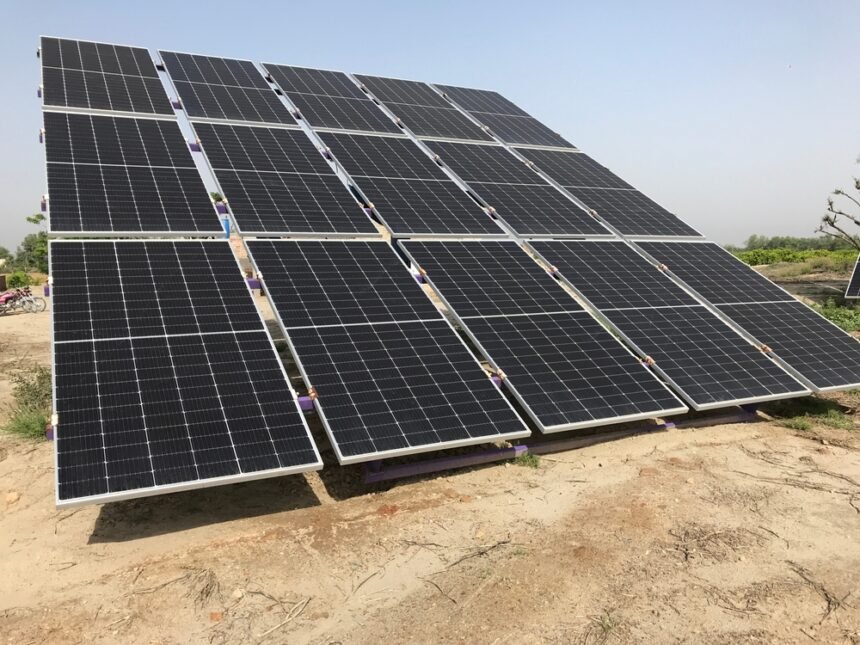Agriculture solar panels are transforming modern farming. They offer a sustainable solution to energy needs and enhance crop production. By harnessing the power of the sun, farmers can optimize their resources and improve their yields. Let’s explore how agriculture solar panels can significantly boost crop production.
Understanding Agriculture Solar Panels
Agriculture solar panels are photovoltaic (PV) systems designed specifically for agricultural use. These panels convert sunlight into electricity, which can power various farming operations. The energy generated can be used for irrigation, greenhouse lighting, and other essential farming activities.
Benefits of Agriculture Solar Panels for Crop Production
Agriculture solar panels provide numerous benefits that directly impact crop production. Here are some key advantages:
Reliable Energy Source
Unlike traditional energy sources, solar power is not affected by fuel price fluctuations or supply chain disruptions. This reliability ensures that farmers can maintain consistent operations, leading to better crop management and higher yields.
Cost Savings
Using solar energy reduces electricity costs. Farmers can save on utility bills and invest those savings back into their farms. Lower energy costs mean more resources are available for purchasing quality seeds, fertilizers, and advanced farming equipment, all of which contribute to increased crop production.
Environmental Benefits
Solar panels reduce the carbon footprint of farming operations. By switching to renewable energy, farmers can decrease greenhouse gas emissions and promote sustainable agriculture. This eco-friendly approach not only benefits the environment but also attracts eco-conscious consumers who prefer sustainably produced crops.
How Agriculture Solar Panels Enhance Irrigation
Irrigation is crucial for crop production. Agriculture solar panels play a vital role in powering efficient irrigation systems. Here’s how they enhance irrigation:
Solar-Powered Pumps
These pumps are efficient and can operate even in remote areas without access to the electrical grid. With reliable water supply, farmers can ensure their crops receive adequate hydration, leading to healthier and more productive plants.
Solar Panels in Greenhouses
Greenhouses provide a controlled environment for growing crops. Integrating solar panels into greenhouse operations offers several advantages:
Climate Control
Solar panels can power ventilation systems, heaters, and cooling systems in greenhouses. This climate control ensures that crops grow in optimal conditions, regardless of external weather variations. Consistent and ideal growing conditions lead to higher crop yields and better quality produce.
Extended Growing Seasons
With the energy from solar panels, greenhouses can operate year-round. This means farmers can grow crops even during off-seasons, increasing overall production. Solar-powered lighting systems also
extend daylight hours, promoting faster growth and higher yields.
Innovations in Agriculture Solar Panels
The technology behind agriculture solar panels is continually evolving. Recent innovations are making them more efficient and adaptable for various farming needs. Some of these innovations include:
Bifacial Solar Panels
Bifacial solar panels capture sunlight from both sides. This dual-sided design increases energy production and efficiency. Farmers can generate more electricity from the same surface area, making bifacial panels ideal for agricultural applications where space optimization is crucial.
Agrivoltaics
Agrivoltaics is the simultaneous use of land for both solar energy and agriculture. Solar panels are installed above crops, providing shade while generating electricity. This approach maximizes land use and offers dual benefits: energy production and enhanced crop growth. The shade from the panels reduces soil temperature and water evaporation, benefiting the crops underneath.
Economic Impact of Agriculture Solar Panels
The economic benefits of agriculture solar panels extend beyond energy savings. Here are some ways they positively impact the farming economy:
Job Creation
From manufacturing to installation, the solar industry generates employment in rural areas. These jobs boost local economies and provide farmers with additional income sources.
Increased Property Value
Farms equipped with solar panels often see an increase in property value. The added renewable energy infrastructure makes the property more attractive to potential buyers. This increase in value can provide financial security for farmers and their families.
Overcoming Challenges
While agriculture solar panels offer numerous benefits, there are challenges to consider:
Maintenance
Farmers need to clean the panels and check for any damages periodically. Proper maintenance ensures the longevity and efficiency of the solar system.
Real-World Applications of Agriculture Solar Panels
Many farmers have successfully integrated agriculture solar panels into their operations. Here are a few examples:
Dairy Farms
Dairy farms require significant energy for milking machines, refrigeration, and lighting. By installing solar panels, dairy farmers have reduced their energy costs and improved their profit margins. The consistent power supply also ensures that dairy operations run smoothly, leading to better milk production and quality.
Vegetable Farms
Vegetable farms benefit from solar-powered irrigation systems. Farmers have reported increased crop yields and improved crop quality after switching to solar energy. The reliable water supply from solar-powered pumps ensures that vegetables receive consistent hydration, even during dry seasons.
The Future of Agriculture Solar Panels
The future of agriculture solar panels looks promising. With advancements in technology and increasing awareness of sustainable farming practices, more farmers are likely to adopt solar energy. This shift towards renewable energy will lead to a more sustainable and productive agricultural sector.
At DSG Energy, we are committed to transforming Pakistan’s energy sector by advocating for renewable energy resources. Our state-of-the-art Grid Tied Solar System installations are designed to transform the way energy is consumed, enhancing reliability and reducing costs. By integrating agriculture solar panels into farming operations, DSG Energy helps farmers boost crop production, improve air quality, and achieve greater energy independence. Join us in creating a sustainable future with our innovative solar solutions.
Conclusion
Agriculture solar panels offer a sustainable and efficient solution for modern farming. They provide reliable energy, reduce costs, and enhance crop production. By integrating solar panels into their operations, farmers can achieve higher yields, promote environmental sustainability, and improve their overall economic stability. As technology continues to advance, the potential of agriculture solar panels will only grow, making them an essential component of future farming practices.
Incorporating agriculture solar panels into farming operations is not just a trend but a necessity for sustainable and productive agriculture. With the right support and investment, farmers can harness the power of the sun to boost crop production and secure a better future for themselves and the planet.





